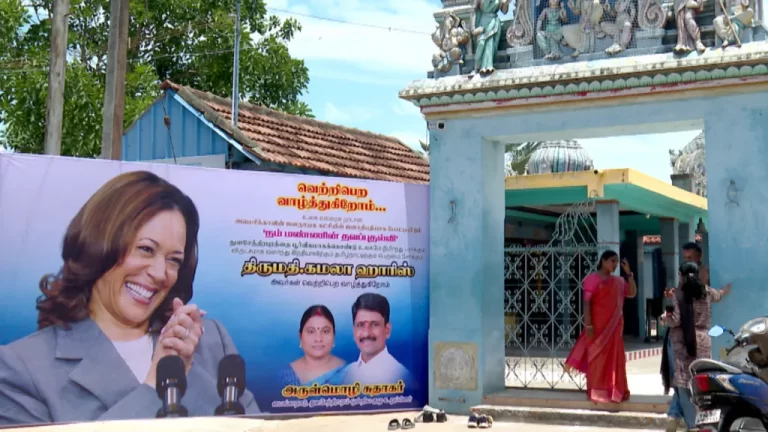Thulasendhrapuram, a tiny village around 300km from the south Indian city of Chennai (formerly Madras) and 14,000 km from Washington DC, is where Kamala Harris’ maternal grandparents were from. The centre of the village is currently proudly diplaying a large banner of Ms Harris, 59.
Special prayers are being offered to the local deity for her success – Ms Harris and her maternal grandfather's names are on the list of donors to the village temple – and sweets are being distributed.
Villagers have been closely observing the US presidential race following Joe Biden’s withdrawal and Ms Harris' rise as the possible nominee.
“It is not an easy feat to be where she has reached in the most powerful country in the world,” says Krishnamurthi, a retired bank manager.
“We are really proud of her. Once Indians were ruled by foreigners, now Indians are leading powerful nations.” There is also a sense of pride, especially among women. They see Ms Harris as one of their own, a symbol of what is possible for women everywhere.
“Everybody knows her, even the children. ‘My sister, my mother’ – that is how they address her,” said Arulmozhi Sudhakar, a village local body representative.
“We are happy that she has not forgotten her roots and we express our happiness.” The excitement and spectacle is a reminder of how villagers took to the streets with fireworks, posters and calendars when Ms Harris became the vice president.
There was a communal feast where hundreds enjoyed traditional southIndian dishes like sambar and idli, which according to one of Ms Harris' relatives, are among her favourite foods to eat.
Indian Roots
Ms Harris is the daughter of Shyamala Gopalan, a breast cancer researcher, who hailed from the southern state of Tamil Nadu, before moving to the US in 1958. Gopalan's parents were from Thulasendhrapuram.

“My mother, Shyamala, came to the US from India alone at 19. She was a force – a scientist, a civil rights activist, and a mother who infused a sense of pride in her two daughters,” Ms Harris said in a social media post last year.
Ms Harris visited Chennai with her sister Maya after their mother died, and immersed her ashes in the sea according to Hindu traditions, according to this report in The Hindu newspaper .
Ms Harris comes from a family of high achievers. Her maternal uncle Gopalan Balachandran is an academic. He grandfather PV Gopalan, rose to become an Indian bureaucrat, and was an expert on refugee resettlement.
He also served as an advisor to Zambia’s first president in the 1960s.
“She (Kamala) has been a prominent figure for quite a while now. It’s not a great surprise. Something like this was on the cards for many years,” said R Rajaraman, an emeritus professor of theoretical physics at Delhi's Jawaharlal Nehru University and a classmate of Ms Harris' mother.
Prof Rajaraman says he lost touch with Shyamala but met her again in the mid 1970s when he travelled to the US and met Ms Gopalan in Berkeley.
“Shyamala was there. She gave me a cup of tea. These two children (Kamala and her sister Maya) were there. They paid no attention,” he recalled.
“Both of them were enterprising. There was positivity in her mother, which is there in Kamala also.”Back in Thulasenhrapuram, villagers are anticipating the announcement of her candidature soon.
“Kamala's chithi (mother's younger sister) Sarala visits this temple regularly. In 2014 she donated 5,000 rupees ($60; £46) on behalf of Kamala Harris,” said Natarajan, the temple priest.

Natarajan is confident that their prayers will help Ms Harris win the election. The villagers say they might be thousands of miles away from the US, but they feel connected with her journey. They hope she would visit them some day or the village would find a mention in her speech.
— CutC by bbc.com


